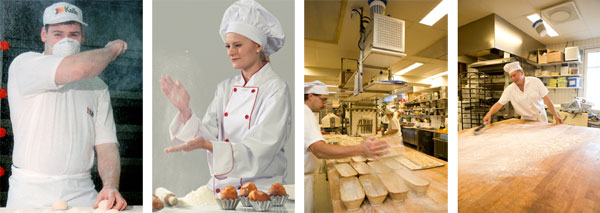Allergy to flour dust: we all look forward to fresh buns, exquisite cakes, cookies and delicious bread from the bakeries. To prepare these delicacies the baker is though exposed to a significant danger. The bakers develop very often asthma due to significant exposure to flour dust.
Various studies have proven that an increased concentration of flour dust and baking powder in the air leads to an enhanced risk to develop asthma.
The hazardous respirable dust in the bakeries is not even visible. Sensitive persons might register only a tickling in their nose, but due to the fineness (smaller than 0.020 mm) of this invisible dust it gets deep into the lungs.

Pictures: You can prevent hazards from flour dust with Dustcontrol's Air Cleaners and Vacuums. As you can see the air is free from airborne dust in the last two pictures.
Allergy to flour dust: The danger is invisible and insidious
Many bakers do not notice anything for years, while all the time the exposure to flour dust is affects their health. The dust is so fine, that it’s invisible. The allergy to flour dust can occur suddenly through a heavy asthma attack, respiratory distress and watering eyes. These are sure signs that you are sensitive to flour dust and react allergically to it.
Allergy to flour dust: Every sixth baker is affected!
Allergy to flour dust in a bakery is an occupational illness. In most cases the allergy develops over a long time period and in three stages:
- First stage: Allergic rhinitis and conjunctivitis
Symptoms are head cold, watery eyes, sneezing and nasal hyperactivity - Second stage: Reversible allergic reactions of the bronchial system
This is manifested by cough, dyspnoea, sputum, sweat and raised susceptibility to infections. - Third stage: Irreversible, allergic bronchopathy
In the third stage irreversible damage to bronchial system has already incurred.
How can you diagnose flour dust allergy?
Once you have got the above mentioned symptoms (runny nose, watery eyes, asthma) go directly to a doctor. If you are a baker, or working in a bakery, the origin of these causes has to be immediately defined. The doctor has the following options to diagnose the causes:
- Skin test: determination of the main allergen, eg. pollen, dust, animal dander, moulds etc.
- Prick test: This test is quite accurate. The skin is pricked by different allergens. If you are allergic to a certain allergen, the skin gets irritated and turns red.
- Intradermal test: In this test the sensitivity to “weak” allergens is determined.
- Bronchial provocation test: The bronchi are brought in direct contact with the allergen (eg. component of flour dust) to provoke an allergic reaction.
- RAST test: This is a blood test diagnosed by a lab. RAST is an abbreviation of Radio-Allergo-Sorbent-Test). The higher the RAST value, the higher the degree of sensitization.
What could help a baker to reduce the risk of allergies?
Allergy to flour dust can threaten his whole existence if he does not do something about it. If he ignores the symptoms his asthma and allergies can develop stronger to a point of irreversibility. Today there are several actions to be taken, which help bakers with allergies to flour dust. Which actions you could make use of can be found in the sequel to this article with the title “Dust: Special Techniques to Avoid Asthma in Bakeries”.
Read more about occupational ill health risks in bakeries...
Watch a clip about the dangers of, for example flour dust in Bakeries. How it contributes to asthma and how you can prevent your coworkers from it.
An article in an article series of dust in seven parts
- Dust: The Invisible Danger
- Dust: The Causes
- Dust: Hazard of Asbestos
- Dust: Hazard of Silicosis
- Dust: Hazards in Welding
- Dust: Hazard of Asthma in Bakeries
- Dust: Special Techniques to Avoid Asthma in Bakeries
By Thomas Pfister, expert commentator in occupational safety at experto.de
 United Kingdom
United Kingdom  Sverige
Sverige  Deutschland
Deutschland  Suomi
Suomi  Austria
Austria  United States
United States  .com
.com  France
France 
 01327 858002
01327 858002
